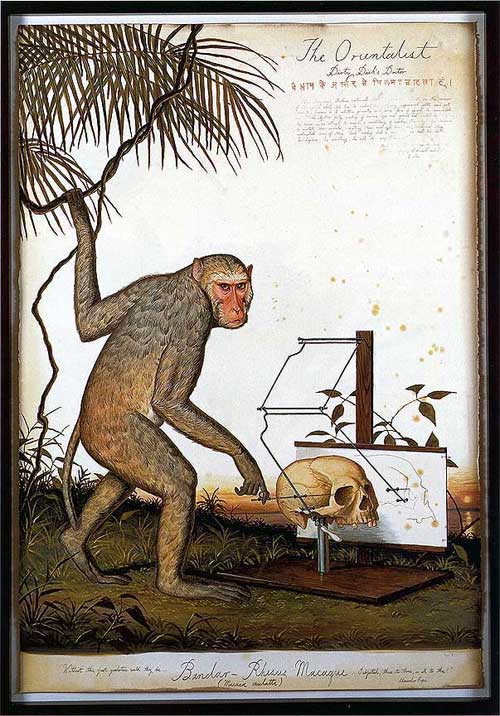Literary critic Terry Eagleton discusses his new book, Reason, Faith, and Revolution: Reflections on the God Debate, which argues that “new atheists” like Richard Dawkins and Christopher Hitchens “buy their rejection of religion on the cheap.” He believes that, in these controversies, politics has been an unacknowledged elephant in the room.
Nathan Schneider: Rather than focusing on “believers” or “atheists,” which are typically the categories that we hear about in the new atheist debates, you write about “a version of the Christian gospel relevant to radicals and humanists.” Who are these people? Why do you choose to address them?
Terry Eagleton: I wanted to move the arguments beyond the usual, rather narrow circuits in order to bring out the political implications of these arguments about God, which hasn’t been done enough. We need to put these arguments in a much wider context. To that extent, in my view, radicals and humanists certainly should be in on the arguments, regardless of what they think about God. The arguments aren’t just about God or just about religion.
NS: Are you urging people to go to church, or to read the Bible, or simply to acknowledge the historical connections between, say, Marxism and Christianity?
TE: I’m certainly not urging them to go to church. I’m urging them, I suppose, to read the Bible because it’s very relevant to radical political concerns. In many ways, I agree with someone like Christopher Hitchens that most religion is fairly hideous and purely ideological. But I think that Hitchens and Richard Dawkins are gravely one-sided about the issue. There are other potentials in the gospel and in the Christian tradition which are, or should be, of great interest to radicals, and radicals haven’t sufficiently recognized that. I’m not trying to convert anybody, but I am trying to show them that there is something here which is in a certain interpretation far more radical than most of the mainstream political discourses that we hear at the moment.

NS: You’re a literary scholar, and you’re talking about religion. Is religion literature? Are you proposing that religion become a resource for politics to draw from in the same way as any other literary canon might be?
TE: No, not at all. I think the whole movement to see religion as literature is a way of diffusing its radical content. It’s actually a way of evading certain rather unpleasant realities that it insists on confronting us with. One of the things that happened in the 19th century was that culture — literary and other kinds of culture — tried to stand in for religion, and there was a lot of talk about religion as poetry and religion as myth. That was an attempt to shy away from some of the more uncomfortable challenges of religion when taken rather more seriously.
NS: And those are the political challenges?
TE: Largely. Or, if you like, the ethical-political. They were forgotten, or sidelined, and Christianity in particular became a piece of poetry or a piece of mythology. There’s a lot of poetry and mythology in the Bible, to be sure, but it interacts with other kinds of elements, and that’s what I was stressing.
NS: Do you think that these traditions need to be radically reinterpreted for the modern, secular world? Thomas Aquinas is mentioned in your book, but so are — perhaps even more — Karl Marx and Sigmund Freud. Is the religion you’re defending closer to that of the medieval scholastics or to these more recent figures?
TE: I think that the Christian gospel always stands in need of contemporary reinterpretation. Theologians have to determine what kind of discourse, what contemporary way of talking, can best articulate its particular concerns. There should be controversy and debate. While Marx and Freud and others are relevant to the contemporary interpretation of Christianity, that doesn’t mean one rejects tradition and simply concentrates on the present. The present is made out of tradition and out of history. What I’m offering in my book is what I take to be — although it’s couched very often in terms of Marx or Freud or radicalism in general — a fairly traditional interpretation of scripture.
NS: Though of course the Christianity you present doesn’t sound like a lot of the Christianity one hears in the public sphere, especially in the United States.
TE: I think partly that’s because a lot the authentic meanings of the New Testament have become ideologized or mythologized away. Religion has become a very comfortable ideology for a dollar-worshipping culture. The scandal of the New Testament — the fact that it backs what America calls the losers, that it thinks the dispossessed will inherit the kingdom of God before the respectable bourgeois — all of that has been replaced, particularly in the States, by an idolatrous version. I’m presently at a university campus where we proudly proclaim the slogan “God, Country, and Notre Dame.” I think they have to be told, and indeed I have told them, that God actually takes little interest in countries. Yahweh is presented in the Jewish Bible as stateless and nationless. He can’t be used as a totem or fetish in that way. He slips out of your grasp if you try to do so. His concern is with universal humanity, not with one particular section of it. Such ideologies make it very hard to get a traditional version of Christianity across.
NS: There are so many competing claims for supernatural revelation; some people say they adjudicate truth by the Bible, or by papal authority. How do you know one reliable supernatural tradition from another?
TE: Well, you have to argue about it on the basis of reason, and evidence, and analysis, and historical research. In that sense, theology is like any other intellectual discipline. You don’t know intuitively, and you certainly can’t claim to know dogmatically. You can’t simply, in a sectarian way, assert one tradition over another. I don’t think there’s any one template, any one set of guidelines, which will magically identity the correct view. Theology, like any other intellectual discipline, is a potentially endless process of argument. But that’s not to say that anything goes.
NS: One thing that stood out to me was your reassertion of liberation theology, which, for instance, the current pope repudiated when he was Prefect of the Congregation for the Doctrine of the Faith. He was concerned that hope for a worldly liberation through revolution would become a substitute for spiritual liberation through Christ.
TE: It would certainly be a big mistake to identify any particular human society with the kingdom of God. If any liberation theology were doing that, then it would be properly rebuked. I don’t think that’s why the pope is averse to it; he’s averse to it anyway because of its politics. It would be a grave mistake to think that we’re talking about the difference between a material revolution and a spiritual one. That would be the kind of gnosticism, or dualism, which Judaism and Christianity challenge. A socialist revolution is quite as spiritual as the fight for the kingdom of God is material.

NS: Do you consider yourself a Christian per se, or a person who happens to like and be inspired by Christianity?
TE: I don’t think the pope will consider me a Christian. I was brought up, of course, a Catholic. I suppose it was fortunate that around the time of the Vatican Council I encountered, just when I might have rejected a lot of it, a very challenging version of Christianity. I felt there was no need to reject it on political and intellectual grounds, because it was highly relevant and sophisticated and engaging. In a sense one doesn’t have much choice about these things. What I find is that heritage very deeply influences my work, and probably has more so over the last few years. Quite what my relation to it now is is hard to say. But that’s just a historical dilemma, a matter of how to understand oneself historically.
NS: When you talk about it being beyond choice — I’ve been interested to see how Richard Dawkins calls himself a “post-Christian atheist” and talks about celebrating Christmas.
TE: I think, actually, he’s a pre-Christian atheist, because he never understood what Christianity is about in the first place! That would be rather like Madonna calling herself post-Marxist. You’d have to read him first to be post-him. As I’ve said before, I think that Dawkins in particular makes such crass mistakes about the kind of claims that Christianity is making. A lot of the time, he’s either banging at an open door or he’s shooting at a straw target.
NS: You say he emphasizes a “propositional” account of religious faith above a “performative” one. But how far can one go believing in God performatively, through political acts, before it becomes a proposition?
TE: All performatives imply propositions. There’s no point in my operating a performative like, say, promising, or cursing, unless I have certain beliefs about the nature of reality: that there is indeed such an institution as promising, that I am able to perform it, and so on. The performative and the propositional work into each other. But it is a typically positivist kind of mistake to begin with the propositional, just as it would be for someone trying to analyze a literary text, which is basically a performance. Somebody who didn’t grasp that would be making a root-and-branch mistake about the kind of thing being confronted. These new atheists, and, indeed, the great majority of believers, have been conned rather falsely into a positivist or dogmatic theology, into believing that religion consists in signing on for a set of propositions.
NS: Are there political reasons behind this mistake?
TE: Dawkins and I were recently asked to write articles for the front page of the Wall Street Journal, if you can believe it. I don’t know what the rationale behind this is, or even if it will come off. I said that I would do so, provided that my last sentence would be, “Jesus Christ would never have been given a column in the Wall Street Journal.” It is indicative of the strangeness and intensity of this debate that it crops up in the most peculiar places. It crops up at the very temples of Mammon. But, you see, I think that’s because these people really do think it’s just about a set of ideas, of propositions. That’s a pretty comfortable debate. But the point I try to make when I enter on these forums is that it’s not just that. It has a strong political subtext.
NS: Back to issues of faith and reason — your position reminds me of Stephen Jay Gould’s model of “non-overlapping magisteria.” Gould himself was not a believer, though he wrote about religion and science, and sometimes he has been accused of having a position that is only possible if you’re not really taking belief seriously.
TE: I think that Gould was right in that particular position. What is interesting is why it makes people like Dawkins so nervous. They misinterpret that position to mean that theology doesn’t have to conform to the rules and demands of reason. Then theologians can say anything they like. They don’t have to produce evidence, and they don’t have to engage in reasonable argument. They’re now released from the tenets of science. Traditionally, this is the Christian heresy known as fideism. But all kinds of rationalities, theology included, have been non-scientific for a very long time and yet still have to conform to the procedures of reason. The new atheists think this because they falsely identify the rules of reason with the rules of scientific reason. Therefore if something is outside the purview of science, it follows for them that it is outside the purview of reason itself. But that’s a false way of arguing. Dawkins won’t entertain either the idea that faith must engage reason or that the very idea of what rationality is is to be debated.
NS: The atheists have promoted themselves by wearing big red “A”s on their t-shirts and calling themselves “brights.” Is there a counter-movement you’d like to begin? What would you put on the t-shirt?
TE: Rather than simply man the barricades on either side, I’d like to step back and see what’s happening here. That sort of gesture has to be understood in terms of an American society in which a relatively small coterie of self-consciously enlightened atheists or agnostics are indeed confronted with a massively ideologized religion, which in many respects is very ugly indeed. What I think is wrong, and what I think is rationalistic, is to cast the argument in terms of intelligence. It may be that a lot of people who believe that they’re going to be rapt up into heaven are fairly dim creatures. On the other hand, Europe is full of dim agnostics. It is a rationalist error to think that your opponents are simply stupid. That betrays what’s wrong with this particular kind of new atheism: it casts the arguments largely in intellectual and propositional terms and doesn’t see that a great deal else is involved here.
NS: Do you think that it’s an accident that the most successful of the new atheists, Richard Dawkins and Christopher Hitchens, come with English accents?
TE: No. England is a very agnostic society. It looks with amazement on the behavior of many Americans as far as religion goes. America, of course, is in all kinds of ways out of line. It’s still an enormously metaphysical and religious society, while the typical advanced capitalist culture is pretty skeptical. Advanced capitalist societies do not normally call upon their citizens to believe very much, as long as they roll out of bed and do their work. They are pretty post-metaphysical. In a sense, Britain is a post-metaphysical society. A very small minority of people go to church. Religion is not part of a public and political discourse in anything like the way it is in the States. The States is peculiar because it is, on the one hand, the most rampantly capitalist society in history and, on the other, deeply, deeply metaphysical. Really, those two things are inherently at odds. Markets are relativizing, pragmatizing, and secularizing. But to prop them up, to defend them, and to legitimate them, you may need some much more absolute values. That may be why there are a lot of psycho-spiritual stockbrokers around.

This interview was first published in The Immanent Frame on 17 September 2009; it is reproduced here for educational purposes.

Δεν υπάρχουν σχόλια:
Δημοσίευση σχολίου